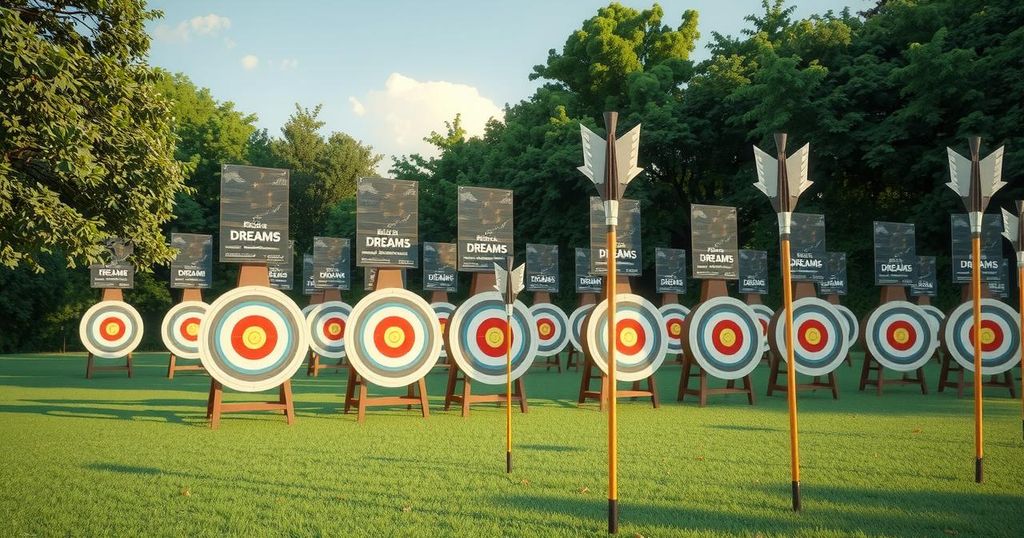Leadership Crisis Hindering the Aspirations of Nigerian Archers

The article outlines the leadership crisis within the Nigeria Archery Federation (NAFED), which has hindered athletes’ opportunities to compete internationally. Damilola Sholademi, despite his successes, cannot represent Nigeria due to bureaucratic complications. Allegations of electoral manipulation, lack of an active governing board, and failure to integrate archery into national events exacerbate the situation, prompting calls for leadership reform and grassroots development in the sport.
Damilola Sholademi, a prominent member of the Nigerian National Archery Team, expresses concern over the impediments caused by bureaucratic inefficiencies within the Nigeria Archery Federation (NAFED). His notable achievements, including 14 medals in individual events, have not translated to opportunities in international competitions, as Nigeria currently lacks a good standing with the World Archery organization. Administrative challenges hinder his ability to represent his nation officially at major events despite his success in the sport.
The crisis in Nigerian archery is largely attributed to NAFED President Mohammed Abdullahi, whose extended tenure has generated controversy. Critics allege that he has manipulated electoral processes and maintained power through strategically held congresses that limit participation. Abdullahi denies these claims, asserting that he has proactively built Nigeria’s archery structure since assuming leadership in 2016. Despite his assertions of progress, discontent within the archery community persists.
Former NAFED Secretary Olugbenga Boluji has been vocal about the alleged electoral irregularities. He claims the elections were moved away from Lagos to Abuja, allowing unfamiliar participants to dominate. Furthermore, Bamaji alleges that video evidence showed irregularities, leading the World Archery to annul the election results. Abdullahi contests these allegations, stating that complaints filed against his administration are unfounded and indicative of internal divisions within the federation.
One of the most pressing issues facing NAFED is the lack of an active governing board, as stipulated by its constitution. This absence of oversight has led to allegations of exclusionary governance and a disregard for proper structural guidelines. Additionally, questions have arisen regarding the legitimacy of voting delegates, prompting calls for reform to restore integrity within the federation’s electoral processes.
Critics argue that the administration has failed to prioritize grassroots development, leading to a concentration of archery activities solely in the Federal Capital Territory. Boluji highlights that the sport’s absence from national games reflects NAFED’s negligence. Moreover, financial support for athletes is minimal, resulting in many having to self-fund their international competition participation, which stifles Nigeria’s global competitiveness.
Acknowledging the crisis, World Archery has refused to accept NAFED’s recent congress results, citing electoral inconsistencies. Following discussions, they proposed a roadmap for NAFED to reorganize its elections under the supervision of the Nigeria Olympic Committee. The conditions outlined include the establishment of an independent election committee to oversee the process and ensure transparency.
NAFED is slated to hold its Annual General Meeting on March 10, 2025, with the agenda addressing confidence in leadership, financial auditing, and patron appointments. However, skepticism remains regarding whether this meeting will facilitate genuine reform or continue existing power dynamics. Abdullahi remains resolute in his position and believes he has the backing to lead.
Many stakeholders call for a complete leadership overhaul to restore the sport’s integrity. Concerns voiced by Sholademi reflect the existential impact of ongoing leadership conflicts, as athletes face barriers to competition opportunities and funding. He emphasizes the potential of Nigerian archers and urges for systemic changes to support the sport’s development effectively.
The leadership crisis within the Nigeria Archery Federation significantly impedes the aspirations of Nigerian archers. Administrative turmoil, characterized by allegations of electoral manipulation and a lack of transparent governance, has left talented athletes like Damilola Sholademi without opportunities to represent their country on international stages. Ongoing calls for reform emphasize the need for a return to integrity and grassroots development in the sport. Resolving these issues is critical not only for the athletes’ futures but also for the revival of archery in Nigeria.
Original Source: www.premiumtimesng.com







